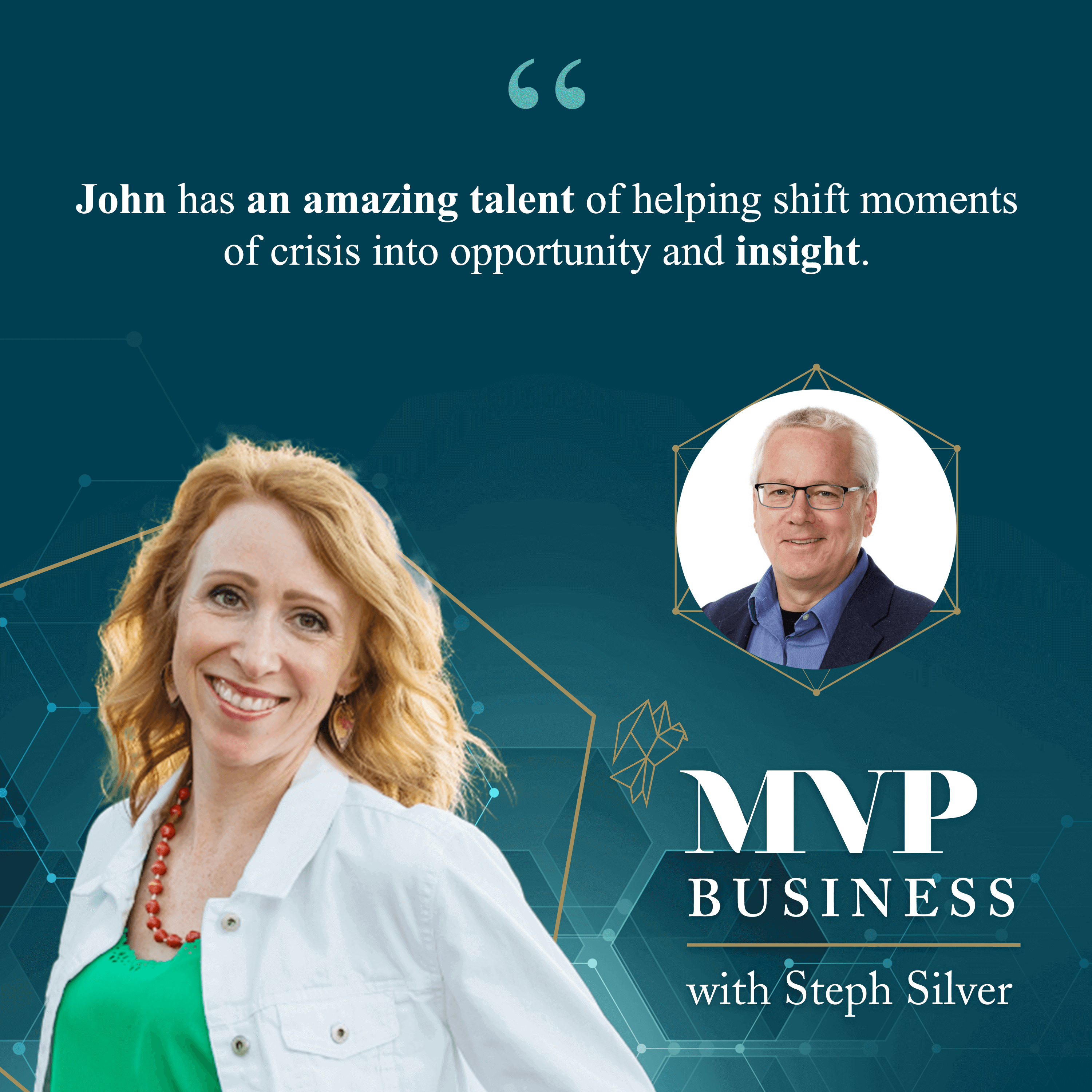Posted on February 27, 2023
Joining the podcast today is John Robertson, crisis coach and founder of FORTLOG Services. John has developed a highly effective encouragement-based approach to crisis communication and management, which his clients deeply appreciate. Listen to today’s episode as John shares life-changing wisdom on transforming crisis situations into golden opportunities for personal and organizational growth.
—
Listen to the podcast here
Developing Resilience Through Crisis Management With John Robertson
Our guest is John Robertson. Inspired and driven by his values, John acts as a facilitator, coach, and guide for his clients as they test, discover, and expand what they can do. He uses concrete verifiable processes to help them achieve demonstrable solution-focused results. Remaining faithful to his passions, he provides spirit-filled insightful guidance that his clients use to amplify their lives and their businesses. John truly provides leadership that people can follow through storms. Thank you so much for joining us, John.
Thank you, Steph. It’s my honor to be here. I look forward to supporting you and your readers. Thank you.
Thank you. We have a lot to talk about. First, let’s learn a little bit about you. Tell us about yourself before you were doing what you’re doing now.
If you google the antonym of Hallmark, we are more like Griswold and the Chevy Chase theme. If it’s going to go wrong, it will. In a lighthearted way, we had a friend over. He and his son came over. He said, “I still remember asking when you used to take your summer holidays.” I said, “I remember that too.” I remember asking, “Why are you asking when we are taking ours?” His focus was, “We need to know what weeks not to take off this summer because ours would be the monsoons, the rains, or all the other stuff.”
I got into this work because it’s a lived experience. One of the things that have always driven me nuts is why we treat people who get a psychological, emotional, spiritual, and moral Charley horse like there’s something wrong with them, or they’re broken. For example, passion. A lot of times, people consider it something, “Rah-rah. Go. You can do it,” instead of what it is. It’s that fire in the bones. What are the things we care about? I ended up years ago going to university to be a doctor or MD. I realized this is not how I’m wired.

Through that process, I started to clarify, “John, what do you care about? What do you want to do?” One of the things that I’ve discovered through 30-plus years of doing this work since I started when I was twelve is I love helping people figure out, “Why does that matter for you? Why is that important for you? What does success mean for you?” and then not being one of those people on shore saying, “Swim harder. Paddle harder.”
I’m one of those people in the boat with a leak saying, “This is exciting. Let’s row.” I’ve done it as a clergy pastor. Some people call it a minister. I’ve done it for crisis response and employee assistance programs. I’ve done it through a first responder organization that I was an employee of and in a complete assortment of those kinds of mosaics so that people would say, “Stop treating ill and start helping people figure out what matters to them. What does finishing well mean?”
That’s all fascinating. I agree with you completely on all of that. Those are my mindsets and mantras as well. How do you coach people when they’re in the middle of it? I’ve been through this. My family is beyond the Griswolds. We were intense. I’m working on a book about it because it’s that funny and crazy. I’ve been through all the challenges, and I know that I can get through them.
It’s the same with looking at everybody else, but when you’re in the middle of it, it’s hard to say, “This is exciting and great. This is what the stuff that life is made of,” as opposed to letting that panic response or fear happen. We know that fear and panic pull you back instead of forward. How do you coach yourself or your clients through that when they’re in the middle of realizing the boat sprang a leak or they hit the glacier?
There are a couple of things in that. First of all, many times, people think that fear is negative. The problem with fear is it’s a normal response by a normal person to an abnormal situation. Therefore, the first thing that we have to do is help people understand, “The problem you’ve got is it sucks to be human because you’re normal. Therefore, if you find a cure for being normal, I don’t want to know what it is.” Reframe that initial pucker moment or tense-up.
The second is people in crisis cannot think long-term. It’s physiologically impossible. Therefore, help them to stop worrying about long-term, “What’s one step you can do by this afternoon or by tomorrow morning?” Slow things down because people who are stressed by fear-based thinking are like drowning persons. They start grabbing anything that is around them. They usually make things worse. First, help them understand normal reactions and abnormal events. Second, slow things down and get that encourager to come alongside to say, “What’s one thing you can focus on doing?”
The way I teach is what I call sweat, flush, fill, and rest. The things that a person can do at the moment are to sweat from physical activity and flush healthy fluids. Fill is nutrition and stomach, but also fill is head. What are we doing with our mindset and our thinking? If I’m watching more news, my fill is not going to be positive or encouraging. The rest is the formula’s recreation recreating and envisioning, which is goal-setting, sleep, which does not mean closing one’s eyes in REM during a crisis, and then Thanksgiving or naming what we’re thankful for. Once those are in place, then we move into, “What’s a longer-term goal? What have we learned through this valley of chaos?”
You’ve already perfectly articulated this. You described it as, “I know I can get through this because I have been through something like this.” That’s what I call faith. Every time we get on a plane, we have faith. What impacts us is when planes don’t work properly and either don’t take off, don’t land, and so forth. Our faith gets a wall up or a psychological Charley horse. We get on the highway. One of the things that we have to help people do is to start normalizing their normal reactions. Steph, did you ever play sports? Did you ever get a physical Charley horse?
Yes.
I’m saying it with huge tongue-in-cheek sarcasm. Do you remember those loving coaches that would say stupid things like, “Skate it off. Walk it off. You’re fine.” You wanted to hit them. Why do we treat people differently? They get a psychological Charley horse. Somebody’s spouse loses a job or gets diagnosed with cancer. That’s a psychological Charley horse, an emotional Charley horse, or whatever we want to call that. Why do we do the same thing that our coach used to do for the physical ones?
“It’s tough, but you should have seen what I had to go through on my drive to work.” The expression I joke with people is it makes us want to play bingo five under the eye. It’s not recommended as best practice. I don’t know your journey, and I’m not asking, but I have seen people, my sister is one, go through a divorce. It was all of the above. It was a physical, moral, emotional, and relational Charley horse telling her that life is better on the other side. How does that help?
To your point, I feel like people do one of two things. They go, “You’re going to be okay and move on.” They ignore it or give too much presence to the pain.
That’s a great visual because that’s where we often move people into counseling instead of calling it for what it is. I see this all the time around grief work. Listen to the stupid unhelpful clichés and one-liners that people say around the death of something. That doesn’t even count the death of a job or finances when somebody invests in something and it goes bankrupt, “I know how you feel.” “I’m sorry. Have you been bankrupt before?” “No.” “How do you know how I feel?” instead of, “That royally sucks. I am not even going to pretend I know how to understand that What can I be for you to know that I’m here and I’m not going to try and fix or diagnose, but what can I be to help you stay in the game?”
I am not going to pretend I understand your problem. I’ll just let you know that I'm here. I won’t try to diagnose or fix you. I’ll just help you stay in the game. Click To TweetKeep moving forward. That was your point earlier, “This is where we are.” When you’re in crisis, you want to jump forward to not being in crisis, but you’re not able to make those big decisions. The visual that came to me is this. Movies illustrate this well when there’s a car accident or a plane crash, or something happens. You go into slow motion. The reality is when you have those moments, and people say, “My life flashed before my eyes,” your brain in those super traumatic moments does slow things down. There’s a purpose in it. That purpose is so that you can see all of the details, take it in, and function on a different level than what you function on a daily basis.
This is your point. You can take that and move it into the function of every day, “I’m not able to process and make good decisions to start moving toward a year from now, especially when we’re in the storm and the boat is sinking. What can I do? Which way can I steer? Which sail needs to be up and which one needs to be down? That’s all I can do. What crew needs to rest? What crew needs to go?”
Part of the premise behind the book that I wrote is in the river of life, there is the eddy effect in the bearing solution. The only reason this is coming to mind is I had this discussion with a person. He said, “I get the eddy effect.” The eddy effect is that in a river, we get into those eddies, but it’s where our emotions steer our behaviors, which end up steering our thinking. The result of that is usually stinky thinking. The bearing solution is to start with thinking and then behave according to that because emotions are responders. When we think and behave, emotions follow.

Crisis Management: Start with thinking, then behave according to that. Emotions are responders. When we think and behave, emotions follow.
To go to your work and some of my work, that is why the focus, the vision, those things, and the values have to be mapped out and defined because that is what our faith is based in so that we start thinking toward that. What happens is there might be those points in the river of life where we need to pull the boat up on shore and catch our breath. That’s not a sin. That’s not wrong, evil, or bad.
It’s a reality of being human. I don’t know if it’s my world or the people I hear and listen to, but it’s almost like people have become in such a hurry. That’s part of the benefit of COVID. I call them hot water teabag moments. If you want to find out what’s important to a person or an organization, put them in hot water like a tea bag. What’s inside always seeps out. I’m not minimizing the stuff that people have gone through and are going through as a result of COVID.
However, when I am in crisis and I come through the other end, the values that I went in with may not be the values I come out with. Part of why I love what MVP Business is about and some of the backstory business behind that show is when people know what their focus is, when they know what their vision is, and when they know their why. I may get injured, but if I’m playing a game I love, I will find a way to get back in the game. If I’m playing a game I don’t enjoy, any injury will take me out.
It’s important to know that and not to continue to force. If you find that you have that injury and you don’t want to keep going, what is it that is going to get you going again instead of letting yourself stay down, beating yourself up, or saying, “You’re not moving as quickly as you were before.” You mentioned COVID. We were all moving so quickly in sometimes blind directions. When we had to stop, a lot of people realized that they were moving quickly in a direction they didn’t want to go.
The teabag moment for them made them say, “I want a complete change. I don’t want to work for this company I don’t believe in. I don’t want to live in this town that I live in,” or whatever it was. Everybody is shifting. We’re in this weird continual shift moment because it seems like everyone is trying to figure it out at the same time, but we think that we should be moving at the speed at which we moved before COVID when most of us didn’t like that speed.
Going back to that river analogy, one of the things that happen is when we’re caught up in the current, it’s easy to think, “This is the way life is.” When something happens that impacts the current or us in it, it creates an automatic reset. It’s like a computer when it’s not working. Ninety-nine of the problems can be fixed. That might be an exaggeration.
I’m not an IT person, but when we reboot the computer, it’s fascinating the number of problems that go away. What happens to people in crisis who are stressed and who have a fear-based orientation is it is always reactive and usually increases speed. Like the Mad Hatter out of Alice in Wonderland or the magician from Frosty the Snowman, they’re busy, “I’m late,” but they’re not sure where they’re going.
Nobody knows what they’re doing.
Like the bumper sticker, the one with the most toys wins. One of the things that I teach is, “Is there any greater failure in life than to succeed in a way that does not matter in the long run to you?” It’s fascinating because part of what’s going on in our workplace is younger people are not drinking the pension and benefits Kool-Aid. They’re not, “I put up with it. I’ll stay with this job because there’s a pension. There are benefits.” They’re asking those hard questions to say, “I don’t want to work in this workplace. This isn’t even unhealthy. This is toxic. I’m done. I quit. I’m out.” People are being encouraged or challenged to say, “What matters in the long run for you?”
Move forward in that. To your point earlier, maybe you go through a change that makes you realize that what you thought you were going after is not what you want anymore because we all are constantly growing and changing. I have children that are young, not little bitty anymore, but I have the benefit of being able to watch them. Adults think that we stop growing and changing, and we don’t have phases anymore after 18 to 21, but the reality of that is that we’re constantly growing and changing. We do have phases that we go through.
The whole midlife crisis thing is not meant for the man with a Corvette and the pretty young wife. It’s something that we all go through. We go through it in different ways and at different times based on whatever tragedy or life-changing event happens. It’s okay to change directions and admit that you were heading quickly in the wrong direction even if that wrong direction looked like the right direction and even if that wrong direction got you the most toys. How do you feel now that you have all those toys? Are you in love and excited about life? Are you looking at your toys with complete loneliness in your heart?
There was a researcher at a research group out of the US California who described it as what’s called the Sudden Wealth syndrome. What they have discovered is people who increased in wealth and didn’t have that joy, meaning, or purpose were more depressed and anxious than the people who didn’t have wealth. You and I were chatting briefly earlier. One of the things that we have to start reframing is to change when we grow. I call it growing through it. When we go through change and look back on it, we call it growth almost always, whether it be forced or self-selected.

Crisis Management: The Sudden Wealth Syndrome: People who increased in wealth did not have joy, meaning, and purpose, so they are more depressed and anxious than people who didn’t have that much wealth.
When we go through change, we call that growth. Any living organism that is not growing is doing something else. Get busy living or get busy dying. Change for the sake of change is foolishness. Change toward a purpose is growth. That’s why that vision, those values, or that focus are so important because that means, “Who are the people in my boat with me? Who are the people that I can encourage?” Life becomes a lot more intentional or focused, and therefore purpose-driven.
What we were discussing is that we grew up thinking that we get the lesson and then the test, but as adults, we get the test and then the lesson. The trouble that we get into and where the fear and anxiety can take over is when we have the lesson or the test presented to us. We don’t get the lesson, so we repeat it or travel with that pain and keep it with us as opposed to saying, “That’s why that was presented to me. How can I use that as a gift and move forward?”
I was in high school. I was in drama, and I’m still dramatic. I said, “I want to feel everything that this life has to give me. I know that there’s so much pain, but I also know that there’s so much joy. There’s so much that this world can give.” Now that I’m older, I’m like, “Did I want that?” I’m feeling and experiencing all these things, but the truth is I can learn something from everyone, and I can see the beauty and the humanity in it. I can see that the only way I’m able to experience and feel these things is if I’m alive and human. Animals experience a lot of things as well, but not their consciousness of it.
When I’m in the middle of the pain, I try and do this with my clients as well to say, “What if we looked at this as an opportunity? What if we looked at this as something beautiful? What if we looked at this as something to look back on and say, ‘I’m so glad I had the opportunity to experience that and learn that lesson?'” I can be more empathetic with someone else. I can hopefully avoid that situation in the future.
Isn’t that definition of insanity doing the same things over and over? If I am not, if you are not, and if we are not growing forward, then we can start to feel like a punching bag for life. Lessons aren’t going to stop because we have decided to stop growing. The only choice we have is, “Are we going to grow forward? Is life going to punch us backward?” When we start to do those things, we start to discover insights. For example, I was working with one individual.
One of the questions you mentioned is, “Is this an opportunity? Is there something we can learn from this?” I start with the same premise, but I ask, “Why does that bother you? What do you mean?” I challenge, encourage, or force them depending on the person to explain to me why this bothers them. What happens is values are the only things that answer the why question because values speak to our motivation. They start to share with me what bothers them about it and why this situation bothers them.
Values speak to our motivation, so they are the only things that can answer the question of “why?” Click To TweetIt was Mother Teresa who once said that North America has a far worse disease than anything she ever treats. I remember that Larry King was the guy doing the interview, “What do you mean worse disease?” Her comment was so insightful. She said, “North America is the disease of loneliness. The people I serve are not lonely.” If you look at some of the fallout over COVID and the tragic spinoff of busyness, the byproduct is loneliness. I don’t like selling. How do I offer mention?
The little bit I’ve read about you and what we have spoken about is that part of the value that we add for people in the river of life is a private thinking partner. We’re not interested in telling you what you should be, what you should do, and so forth. However, we’re not going to tell you your thinking is fine without asking the hard questions. We love you enough to ask about what we’re seeing. People who don’t want to grow get defensive. People who want to grow and move forward say, “I never thought of it that way. What are you seeing?” All of a sudden, we have this phenomenal discussion that never would have happened had life not put a stick in the spokes.
In that context of helping people thrive, finishing well, meaning and purpose, or whatever I’m supposed to call this, rather than looking at crisis as something to avoid, I go back to the definition of crisis. Crisis originally was spelled Krisis. It means four things in its definition, but three of them are, “It’s unexpected. It’s a threat to a person’s well-being. It’s a threat to our goals.” The fourth one that I focus on is that point where the status quo is no longer an option. What is a crisis? It’s an ESPN or TSN turning point in a game where we can no longer play the same way we were playing. It’s not good or bad. The same thing that got us here will not take us to the new place.
That’s the benefit of slowing down and having that partner to talk through something with.
I will challenge your readers to please hear what you said. Have that private, confidential, or whatever you want to call it thinking partner because we are not objective about our stories.
Our friends, spouses, and business partners aren’t either. Everyone has their perspective of their life when they’re in it. Consultants don’t even do it the same way, but the reason I love having coaches on this show is that the way that coaches think and ask is so much different than anything else even therapists and counselors because they’re not trying to dig in to solve a particular problem. It’s a way of asking and bringing something out in the people that we’re talking to that helps to clarify, enlighten, and bring a different way of thinking.
Amen to that. I don’t know what you’re like, but in my journey, I’ve had enough people who have done, “John, you should.” It’s like, “Thank you. It’s helpful.”
“I haven’t thought of that one.”
If I’m drowning, somebody is saying, “Swim harder.” Thank you. I would never have thought of that, but I appreciate the insight.
“Don’t breathe in when you’re underwater.”
I even struggle with the term coach because one of the things that I’ve noticed over the last few years or a little while is sometimes people get into a profession so that we can help everybody else because our journey is not going anywhere. It’s like, “Hold it. I’m not in coaching, consulting, speaking, or whatever I’m supposed to call the work I do because my life isn’t working.” You and I were joking about the non-Hallmark story moments. I don’t want people to finish in a place they don’t want to finish. I’m not interested in telling them what it should be, but I do care enough to ask those hard questions so that they finish well.
I don't want people to finish in a place they don't want to be. I'm not interested in telling them what that place should be, but I care enough to ask the hard questions so they finish well. Click To TweetI used to think before I had my coach that a coach was there to kick somebody’s butt to hold them on task and push them forward. Maybe it’s the coach that I have as well, but it’s also the types of coaches that I have on this show. It wasn’t until I got my coach that I realized that the purpose of a coach is mostly to ask questions to see the in-betweens of what you’re saying and ask the questions to get you thinking about things a little bit differently, moving forward toward what you have already shown as your passions and your vision, and seeing where you’ve taken a different step than you thought that you wanted to or help you get off the ledge when you’re high up there.
You do a lot of reframing of crisis, but when your clients or the people that you’re talking to are either past that or before that, how do you go about developing trustable leadership? That’s a big part of what you do as well. You do a lot of the crisis reframing. We know that when you’re in leadership, you never know when that crisis is going to come around the corner, but hopefully, we can mitigate that by being the trusted leaders and trustable leaders that people expect us to be.
There are a couple of things on that, and you’ve already put your finger on one of them. Part of the story of that trustable leader is twofold. It’s qualities and qualifiers. Quite often our culture society looks for people who are leaders either by title, education, or the letters after a person’s name to lead into a frontier. I love what William Bridges calls it in Managing Transitions, “To lead into the promised land, leaders have to lead through a transition.” That is a leadership style that is less positional and title-based and more who one is.
Therefore, one of the first and most important pieces is if the focus is trustable, respectable, followable, or likable. You mentioned children. My wife says she has four, but together, we have three. One of the things that happen is, “Do I want to be likable? Do I want to be trustable, respectable, and followable?” Those are very different defining moments that are always revealed through change, growth, or crisis.
As an aside, readers, please remember that the event is never the real crisis. You and I can go through the same event, and I’m thinking, “That was ugly. Let’s carry on.” The other person is still the deer in headlights. When we talk about qualities and qualifiers, am I authentic? If you meet me at the post office, the hockey rink, the soccer pitch, or the football field, are you meeting the same persona caricature that you meet in the workplace? Is John Batman’s enemy Two-Face? Is John a different person in those different environments?
The best illustration I’ve heard of this is a story. A guy gets on the bus and pays the bus driver. The bus driver gives him too much change back. The guy sits down at the back of the bus. As he’s getting off the bus, he comes up to the bus driver and says, “You gave me too much change when I paid for my ticket.” The bus driver looks at him and says, “I know I gave you too much change, but I heard you speak about integrity and I wanted to see if you walked the talk.”
Those are those defining moments as leaders, “How do I treat the custodian? How do I treat the administrator? How do I treat those people who can’t do anything for me? It’s an authentic commitment. When I say something, can you count on it being done? It’s enthusiasm and then service, servanthood, or whatever I’m supposed to call that. Whatever it takes,” versus, “That’s not my job.” When I was doing career counseling and helping people change jobs as adults, it was called career counseling. With young people, it’s called guidance counseling, but the principle is the same thing.
I don’t know the employer, but I thought, “What a phenomenal approach.” The CEO or CFO of the company would go into the waiting room, dress like a person who had been cutting and splitting firewood, and sit down. This person was a female, but it didn’t matter, male or female. They would sit down in the waiting room for people waiting for their interview. Their interviewing process was how that person treated that person who had been dressed not quite homeless, but a couple of bars above it. That was their interview because they could give skills.
When we look at those qualities and qualifiers, “Do I have credibility? Do I have chemistry? Do I have character?” I love the old English term called countenance. We would translate it as composure. Jim Collins quotes the Stockdale Paradox, “It’s a willingness to confront the brutal realities, but the belief that in the end, we will prevail.” The countenance is, “This sucks. I’m not even going to pretend I like anything about this. However, we will prevail in the end. We will get through this.”
I’m going to pause right there again as another thing for readers to think about. As a leader, it’s not only okay, but it’s important for you to say those things to your team, “I understand where we are. I don’t like it, but this is how we’re going to get through it together. I’m going to work with you. We’re going to do this together,” as opposed to panicking in the back room with the door closed.
To your comment, you pick the best person in the world if you have them as a quarterback, but if there are no people blocking for that person and running backs and receivers, it doesn’t matter how good your quarterback is. Your team is not going anywhere. To be the MVP, a person has to understand, “I’m only as good as the health of the other people on the field with me and the whole team.”
When I first started this business and this show, that was the reality that I wanted to communicate in all the different ways. Every single member of your team from your janitor to your packing and shipping department, everybody is just as important. Too many organizations put all of their emphasis on their sales and marketing team or their product development team. They pick the area where they put all the value. They don’t realize that every single touchpoint they have internally and externally is what makes the difference over the long run. If your salesperson is a rockstar but everything else is a mess, you’re going to be a mess.
If your salesperson is a rockstar but everything else is a mess, your company will be a mess. Click To TweetOne organization I did some work with was a very successful car dealership. Everybody in the business world knows that we get sold once on price. After that, it’s always the service that sells the vehicle. I can’t remember what they call the person who does the scheduling. She would book all the service appointments and so forth. She got a couple of psychological and emotional Charley horses and some other stuff going on. He and I got chatting. He said, “I don’t know what’s going on with our workplace, but we are so tripping over each other.” It’s like, “I can tell you why. She’s not head in the game. You are only as good as she is scheduling.”
He didn’t say, “I love you so much, John. Thank you so much for telling me that.” It wasn’t his first reaction. Let’s put it that way. I said, “How are you going to honor her? Your team’s health is only as healthy as she is dealing with customers and scheduling.” Since then, he has turned it around. Even though she was off on sick time, she had a two-week holiday for her brother’s wedding. He said, “Go for it. I’ll see you when you get back. We will adapt.” Guess what kind of motivated employee he has now? It’s not an 8:00 to 4:00 employee anymore. She’s doing whatever she can to honor her workplace.
It’s because he honored her. What other kinds of practices do you recommend to your clients on a regular basis? In your book, what other PR practices, whether it be personal daily practices or system practices do you recommend?
There are a couple of things. First of all, the values are most important. I know I keep banging on this, but we can talk about football. Until we clarify what we mean, there are four footballs that we can be talking about, European, Australian, American, or Canadian. Everybody is talking about football, but nobody is going to play very well together. The second part is to start asking those questions, “Why should and why would somebody want to do business with us? It’s great that I want to make money in my business, but I can’t answer why they would want to do business with me.”
The third piece is, “How do we recognize, appreciate, and value other people that are on the field at the same time?” For example, my wife is one of those people. If you were her boss, Steph, and you invited her to a rah-rah session, say, “We want to celebrate Carolyn. What a wonderful employee she is,” and brought her forward, you would demotivate her because she does not do anything that she does for any of that stuff. We also have a son. He would run up on stage before you even finish.
It’s hardwired in us, “How do I like to be recognized and appreciated?” One of the things the readers can be doing is start listening to people and ask, “If I was to show you how much I value you being part of this workplace, how would you feel appreciated? What would I need to do to show you appreciation?” Part and parcel of that become how the leader leads their way. Therefore, I as the quarterback and the leader have to define who I am as an individual, “What are my values within the corporate context?”

Crisis Management: If I were to show you how much I value you as a part of this workplace, what would I need to do to show you appreciation?
You’re not going to be all things to all people. That’s called a chameleon or a fraud. On the other hand, you may not like me, but you can trust me and respect me. It’s a compliment. It’s how I feel appreciated and recognized. I’ve had people say, “John, I never followed you up. It has been 5 to 10 years. Stop with the preamble. What’s going on?” They start to share what’s going on, “That’s part of the reason I’m calling you, John. I knew that you would call me out on all the excuses and say, ‘What are we going to talk about?'” Who are those people that love us enough not to buy into reasoning and excuses?
For example, I’m going to turn this around. I haven’t scripted or asked for permission, so I’m going to do the forgiveness versus permission. I want you to think about an ideal client or customer that you serve. No names, please. You’ve got a mental picture of 2 or 3. Tell me about qualities that you like about serving and working with them. Don’t think about anything else. How would you describe to me what it is that you enjoy or the why behind working with them?
They’re always appreciative, kind, open, and honest, all of them.
Do you see the first word you used? We live in a time of, “No problem. No big deal. No worries,” but how often do we say things like thank you? Appreciation is not some blank check written for a bonus. Appreciation is the everyday simple little things. They’re honest. I’m not getting into details, but they’re probably not always saying, “I love you so much, Steph.” For the readers, she’s shaking her head no. Part of being honest is speaking the truth in love. It’s not a critical, “I’m going to throw you under the bus,” kind of honesty. That’s glorified judgment.
Being in marketing and branding, my designers are creating things from their hearts and minds combined. I’ve been doing it for over twenty years. More than 70% of my customers in that realm will automatically say, “Change all these things, have it done for me in 24 hours, and don’t charge me too much.” The 20% to 30% that say, “Thank you for turning that around. This is a good first pass,” make all these changes. When my team knows that they said thank you first, they could have a billion changes and need it in fifteen minutes, and they will jump through all the hoops.
In every relationship in the world, it’s the hard conversations that make the biggest difference. My coach says it like this, “Don’t step over the hard things,” but when the hard conversations are had make the biggest difference to say, “I hate this, and I don’t know why. I feel uncomfortable. It doesn’t feel right,” or whatever it might be. It’s being honest instead of letting it get too far.
This is dark in a way, but that’s part of why I love crisis work. Readers, think about this. If you have been through a crisis or a storm for you, you will know those people who have been honest in the storm. They will be a whole different caliber of relationship after the storm. On the other hand, people that we thought would be there and bail, that relationship is forever impacted. That’s not being judgmental. It’s just calling a spade a shovel. One of the things that we have to do is this.
I love the way CS Lewis worded it. He said, “Those kinds of people are the ones who walk in when the rest of the world walks out and allow us to say, ‘You too? I thought I was the only one.'” He worded it far better than that. What is a coach? It is somebody willing to walk in and have those conversations so that on the other side, we come through those refining moments with a whole different way of viewing things. As an aside, do you know the etymology of brand? Do you know where that comes from?

Crisis Management: Are we that kind of person that walk in when the rest of the world walks out?
I’m a Western novel guy. I love Louie L’Amour and so forth. A brand is something that a person puts on an animal. It’s an identifier. A brand comes from the root word that we would say is character. A brand is an authority that comes from how we are recognized based on what is inside us. That is our brand. Sandra Bullock did a movie in Mexico, I believe. It was Our Brand Is Crisis. Like the hot water teabag moments, a brand is how I want people to define my character so that when they meet me and see me, it’s, “That makes complete sense,” moments.
That is all of the brand. I’m glad you’re talking about that because when a crisis comes up or when we’re hiring or putting a product on the shelf, your brand is every bit of how people talk about you when you’re not there. Personally and from a corporate or small business standpoint, it’s how people imagine you and talk about you when you’re not there anymore.
We need to wrap up pretty soon, but one of the important things in our self-healing through a crisis is looking at ourselves in the way that other people see and remember us, instead of that critical voice that tends to cycle through when you’re in the crisis moment the most. Slow that voice down and replace it with what you want to be hearing and saying and what people are. Know fully. Admit fully how they see you and feel about you and be willing to do the tough work to change if you need to if it doesn’t line up.
I want to honor your time and the reader’s time. The premise that I teach this from is from a character or what a person is on stage to a character or what a person is in the dark when nobody is watching. Let’s put some coach questions on the table for your readers. How do you want people to describe you in a nonphysical way? Second question, how do people describe us in a nonphysical way? What do you want to do about the gap?
Steph, I thoroughly enjoyed this discussion. I do want to encourage your readers. Please, get those people around you who are not telling you what you want to hear, but get the coach-type person that says, “What is your brand? How do you want people to describe you nonphysically?” That’s what it means for you to thrive. Steph, I truly appreciate the work you’re doing and this kind of work. Kudos. Thank you for the honor of being here.
John, thank you so much. I appreciate it. Tell us your website real quick so people can learn more about you.
It’s a simple thing. FORTLOG is the company. A fort is a safe place in the frontier. A log is a journal to sail the seas because there’s no point going there alone. It’s FORTLOG.co because I work with people, colleagues, coaches, and collaborators I come alongside. The landing page is FORTLOG.co/MVPBusiness. Shoot me an email at John@FORTLOG.co or book a time, but either way, have that conversation. Thank you, Steph. I enjoyed our conversation. Thank you.
Me too. Thank you so much. Thank you for sharing with us. Thank you for reading. If you liked it, tell your friends and follow us on Instagram or LinkedIn. The mission of the show is to dig deep into the lives of true leaders so that others can follow, knowing that the path isn’t always easy, but the journey is worth it. Enjoy the day and live with passion.
Important Links
- John Robertson
- Managing Transitions
- FORTLOG.co/MVPBusiness
- John@FORTLOG.co
- Instagram – VINE Collective
- LinkedIn – VINE Collective


